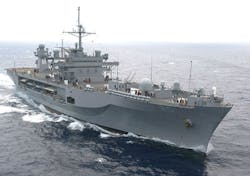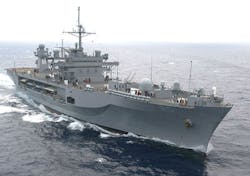Navy chooses RCT Power Systems to design new bi-directional shipboard power conversion modules
U.S. Navy shipboard electronics experts needed experimental power-conversion modules and energy-storage components for advanced ship-board electrical shipboard power systems. They found their solution at the RCT Systems Inc. Power Systems Division in Linthicum Heights, Md.
Officials of the Naval Sea Systems Command in Washington announced a $12.4 million contract to RCT Power Systems for research and developmental testing and manufacturing of bi-directional power conversion modules to support a 4160-volt AC, 60 Hz shipboard electrical architectures.
Navy researchers want these shipboard electronics components to interface with the battery or rotating machine energy storage and power load modules of next-generation, integrated shipboard power systems.
RCT Power Systems experts also will study, analyze, design, develop, and test energy-storage solutions for the power conversion modules. Bi-directional power conversion enables power systems to connect either to storage battery systems or direct-current power supply systems. Typically these kinds of power converters rely on digital power control for efficiency.
RCT Power Systems (formerly Satcon Applied Technology) designs, builds, and integrates products and technologies in power electronics, hybrid and electric vehicles, renewable energy, motors and generators, and power systems architectures. RCT Power Systems will do the work in Linthicum Heights, Md., and should be finished by January 2021.
FOR MORE INFORMATION visit RCT Power Systems online at http://rct-systems.com.

